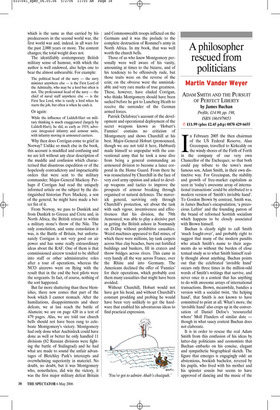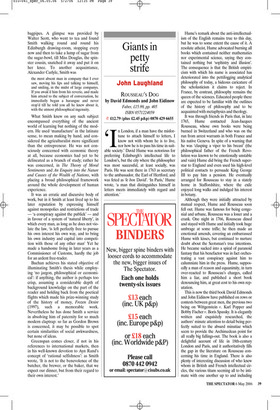A philosopher rescued from politicians
Martin Vander Weyer
ADAM SMITH AND THE PURSUIT OF PERFECT LIBERTY by James Buchan Profile, £14.99, pp. 198, ISBN 1861979053 ✆ £11.99 (plus £2.45 p&p) 0870 429 6655 In February 2005 the then chairman of the US Federal Reserve, Alan Greenspan, travelled to Kirkcaldy on the windy shores of the Firth of Forth in the company of our very own Chancellor of the Exchequer, so that both could pay tribute to the town’s most famous son, Adam Smith, in their own distinctive way. For Greenspan, the stability and growth of free-market capitalism as seen in ‘today’s awesome array of international transactions’ could be attributed to a modern version of ‘Smith’s invisible hand’. To Gordon Brown by contrast, Smith was, in James Buchan’s encapsulation, ‘a precocious Leftist’ and the founding patron of the brand of reformed Scottish socialism which happens to be closely associated with Brown himself.
Buchan is clearly right to call Smith ‘much fought-over’, and probably right to suggest that many of the modern pundits who attach Smith’s name to their arguments do so without the burden of close textual study as to what Smith himself really thought about anything. Buchan points out that the celebrated ‘invisible hand’ occurs only three times in the million-odd words of Smith’s writings that survive, and never once in a context that has anything to do with awesome arrays of international transactions. Brown, meanwhile, bandies a version with a socialist twist, ‘the helping hand’, that Smith is not known to have committed to print at all. What’s more, the ‘invisible hand’ also crops up in the conversation of Daniel Defoe’s ‘resourceful whore’ Moll Flanders of similar date though in what saucy context Buchan does not elaborate.
It is in order to rescue the real Adam Smith from this confusion of his ideas by latter-day politicians and economists that Buchan embarks on his concise, elegant and sympathetic biographical sketch. The figure that emerges is engagingly odd: an abstemious, bookish bachelor, revered by his pupils, who lived with his mother and his spinster cousin but seems to have approved of dancing and the music of the bagpipes. A glimpse was provided by Walter Scott, who went to tea and found Smith walking round and round his Edinburgh drawing-room, stopping every now and then to take a lump of sugar from the sugar-bowl, till Miss Douglas, the spinster cousin, snatched it away and put it on her knee. To another acquaintance, Alexander Carlyle, Smith was
the most absent man in company that I ever saw, moving his lips and talking to himself, and smiling, in the midst of large companys. If you awak’d him from his reverie, and made him attend to the subject of conversation, he immediatly began a harangue and never stop’d till he told you all he knew about it, with the utmost philosophical ingenuity.
What Smith knew on any such subject encompassed everything of the ancient world of learning but nothing of the modern. He used ‘manufacture’ in the latinate sense, to mean making by hand, and considered the agriculturalist more significant than the entrepreneur. He was not consciously concerned with economic theory at all, because economics had yet to be delineated as a branch of study; rather he was concerned, in The Theory of Moral Sentiments and An Enquiry into the Nature and Causes of the Wealth of Nations, with placing a broad philosophical framework around the whole development of human experience.
It was an erratic and discursive body of work, but in it Smith at least lived up to his later reputation by expressing himself against monopolies and restrictions of trade — ‘a conspiracy against the publick’ — and in favour of a system of ‘natural liberty’, in which every man, as long as he does not violate the law, ‘is left perfectly free to pursue his own interest his own way, and to bring his own industry and capital into competition with those of any other man’ Yet he made a handsome living in later years as a Commissioner of Customs, hardly the job for an ardent free-trader.
Buchan achieves his stated objective of illuminating Smith’s thesis while employing ‘no jargon, philosophical or economical’: if anything, the author is perhaps too crisp, assuming a considerable depth of background knowledge on the part of the reader and holding back from the poetical flights which made his prize-winning study of the history of money, Frozen Desire (1997), such a memorable work. Nevertheless he has done Smith a service in absolving him of paternity for so much modern claptrap: so far as Gordon Brown is concerned, it may be possible to spot certain similarities of social awkwardness, but none of ideas.
Greenspan comes closer, if not in his references to international markets, then in his well-known devotion to Ayn Rand’s concept of ‘rational selfishness’: as Smith wrote, ‘It is not to the benevolence of the butcher, the brewer, or the baker, that we expect our dinner, but from their regard to their own interest.’















































 Previous page
Previous page